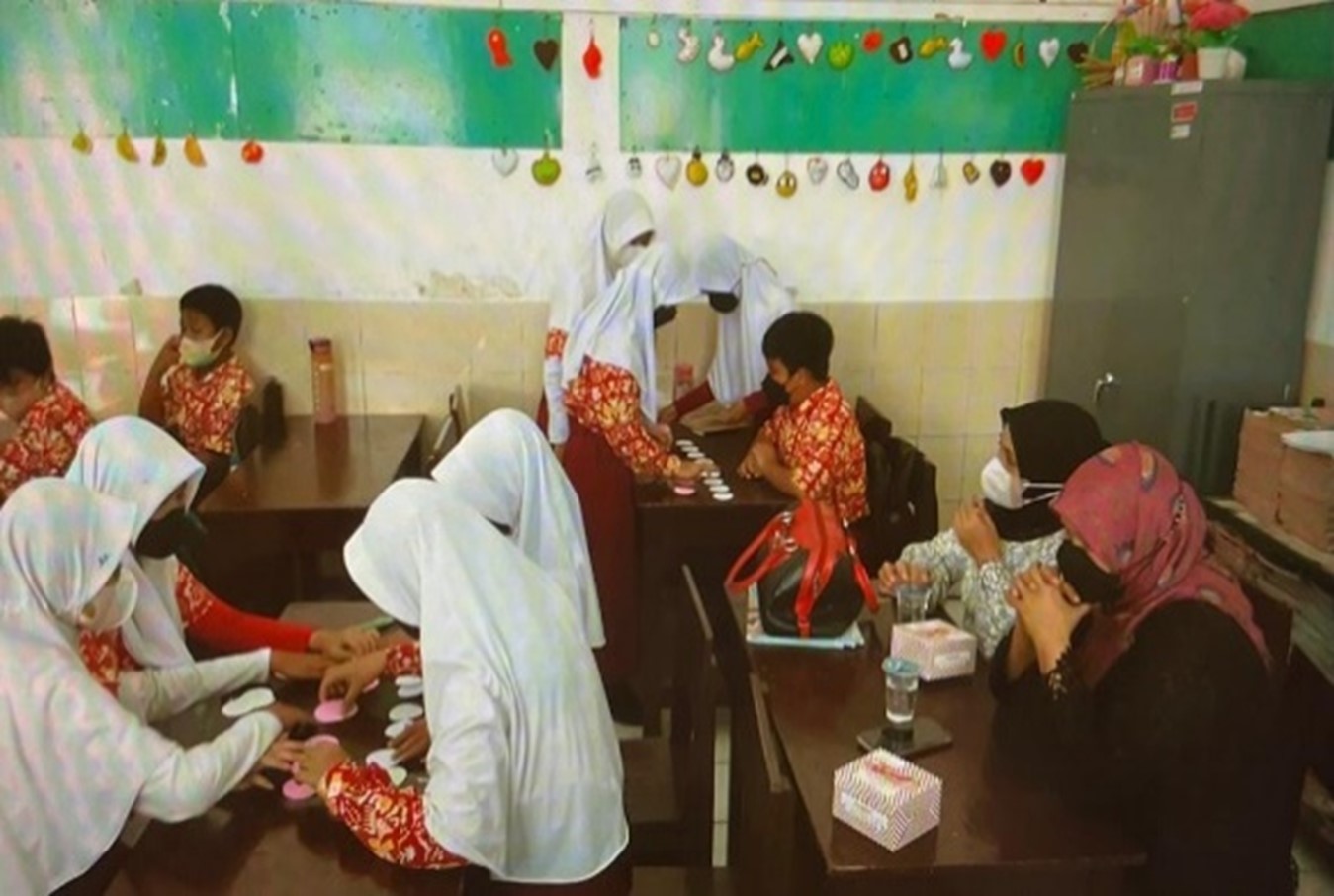PENINGKATAN KOMPETENSI CRITICAL THINKING, CREATIVITY, COLLABORATION, AND COMMUNICATION DI ERA NEW NORMAL
DOI:
https://doi.org/10.47457/jps.v4i2.381Keywords:
collaboration, communication, creativity , critical thinking, vitaminAbstract
The COVID-19 pandemic (coronavirus disease 2019) has caused various problems in terms of health, education, economy, and other aspects. Vitamins are a complex compound that is needed by the body both for immunity and sharpening focus, especially during this pandemic. Therefore, in this social empowerment, the time conducted counseling on the importance of vitamins to teachers, parents, and students of SD Negeri Court 2. The Covid-19 pandemic has also had an impact on students' 4C (Critical Thinking, Communication, Collaboration and Creativity) skills. To overcome this, the members of the social empowerment also conducted learning by using integer chip props to hone students' 4C skills. Through the collaboration of chemistry study program lecturers who provide socialization of the importance of vitamins and mathematics study program lecturers who provide teaching integer operations with integer chips. By these social empowerment activities, students can focus on observing the learning process and honing students' 4C skills.
Downloads
References
Brodeur, Abel, Andrew E Clark, Sarah Fleche, and Nattavudh Powdthavee. 2021. “COVID-19, Lockdowns and Well-Being: Evidence from Google Trends.” Journal of Public Economics 193, no. January (January): 104346. https://doi.org/10.1016/j.jpubeco.2020.104346.
Chitra, Uma, and C Radha Reddy. 2007. “The Role of Breakfast in Nutrient Intake of Urban Schoolchildren.” Public Health Nutrition 10, no. 1 (January): 55–58. https://doi.org/10.1017/S1368980007219640.
Edelman, Carole Lium, and Elizabeth Connelly Kudzma. 2018. Health Promotion Throughout the Life Span. 9th ed. St. Louis: Elsevier. https://books.google.co.id/books?id=QwMvDwAAQBAJ&printsec=frontcover&source=gbs_ge_summary_r&cad=0#v=onepage&q&f=false.
Efimov, Ilona, Volker Harth, and Stefanie Mache. 2020. “Health-Oriented Self- and Employee Leadership in Virtual Teams: A Qualitative Study with Virtual Leaders.” International Journal of Environmental Research and Public Health 17, no. 18 (September). https://doi.org/10.3390/ijerph17186519.
Filimonau, Viachaslau, Belén Derqui, and Jorge Matute. 2020. “The COVID-19 Pandemic and Organisational Commitment of Senior Hotel Managers.” International Journal of Hospitality Management 91: 102659. https://api.semanticscholar.org/CorpusID:221380353.
Gesty, Hanny Ayunda, Fita Fedina, and Annisa Hermawati. 2022. “Pengembangan Alat Peraga Papan Pecahan Dasar Untuk Pembelajaran Matematika Kelas IV Di MI Raudhatul Athfal.” Himpunan: Jurnal Ilmiah Mahasiswa Pendidikan Matematika 2, no. 1: 27–40. http://jim.unindra.ac.id/index.php/himpunan/article/view/6290.
Masrul, Wati, Hendri Silva, and Parlindungan Ravelino. 2022. “Penerapan Metoda Student Center Learning Pada Pelatihan Sketch up Di SMKN 1 Karimun.” Dinamisia : Jurnal Pengabdian Kepada Masyarakat 6, no. 6: 1633–40. https://doi.org/10.31849/dinamisia.v6i6.12497.
Maulida, Aisya, and Adriyan Pramono. 2015. “Gambaran Asupan Vitamin a, Kadar Serum Seng, Dan Status Gizi Pada Anak Usia 9-12 Tahun.” Journal of Nutrition College 4, no. 4: 323–28. https://doi.org/10.14710/jnc.v4i4.10103.
Nasaruddin, Nasaruddin. 2018. “Media Dan Alat Peraga Dalam Pembelajaran Matematika.” Al-Khwarizmi: Jurnal Pendidikan Matematika Dan Ilmu Pengetahuan Alam 3, no. 2: 21–30. https://doi.org/10.24256/jpmipa.v3i2.232.
Partono, Partono, Hesti Nila Wardhani, Nuri Indah Setyowati, Annuriana Tsalitsa, and Siti Nurrahayu Putri. 2021. “Strategi Meningkatkan Kompetensi 4C (Critical Thinking, Creativity, Communication, & Collaborative).” In . https://api.semanticscholar.org/CorpusID:235538046.
Simanjuntak, M. 2019. “Membangun Ketrampilan 4 C Siswa Dalam Menghadapi Revolusi Industri 4.0.” Prosiding Seminar Nasional Fakultas Ilmu Sosial Universitas Negeri Medan 3: 921–29.
Torales, Julio, Marcelo O’Higgins, João Mauricio Castaldelli-Maia, and Antonio Ventriglio. 2020. “The Outbreak of COVID-19 Coronavirus and Its Impact on Global Mental Health.” International Journal of Social Psychiatry. Ventriglio, Antonio: Department of Clinical and Experimental Medicine, University of Foggia, via G. Marconi 3, Foggia, Italy, 71041, a.ventriglio@libero.it: Sage Publications. https://doi.org/10.1177/0020764020915212.
Widodo, Slamet, and Kusuma Rizky. 2020. “MENGAJARKAN KETERAMPILAN ABAD 21 4C (COMMUNICATION, COLLABORATION, CRITICAL THINKING AND PROBLEM SOLVING, CREATIVITY AND INNOVATION) DI SEKOLAH DASAR.” MODELING Jurnal Program Studi PGMI 7, no. September (September): 185–97.
Windari, Catur Okti, and Fitri April Yanti. 2021. “Penerapan Model Problem Based Learning Untuk Meningkatkan Keterampilan Berpikir Kritis Pesera Didik.” Edu Sains Jurnal Pendidikan Sains & Matematika 9, no. 1: 61–70. https://doi.org/10.23971/eds.v9i1.2716.
Zheng, Feng, Naseer Abbas Khan, and Sabir Hussain. 2020. “The COVID 19 Pandemic and Digital Higher Education: Exploring the Impact of Proactive Personality on Social Capital through Internet Self-Efficacy and Online Interaction Quality.” Children and Youth Services Review 119: 105694. https://api.semanticscholar.org/CorpusID:228918278.

Downloads
Published
How to Cite
Issue
Section
License
Copyright (c) 2023 Jurnal PKM Setiadharma

This work is licensed under a Creative Commons Attribution-ShareAlike 4.0 International License.
Authors who publish with this journal agree to the following terms:
- Authors retain copyright and grant the journal right of first publication with the work simultaneously licensed under a Creative Commons Attribution License that allows others to share the work with an acknowledgement of the work's authorship and initial publication in this journal.
- Authors are able to enter into separate, additional contractual arrangements for the non-exclusive distribution of the journal's published version of the work (e.g., post it to an institutional repository or publish it in a book), with an acknowledgement of its initial publication in this journal.
- Authors are permitted and encouraged to post their work online (e.g., in institutional repositories or on their website) prior to and during the submission process, as it can lead to productive exchanges, as well as earlier and greater citation of published work (See The Effect of Open Access).











